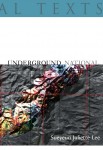Underground National by Sueyeun Juliette Lee | Factory School 2010 | $15

Sueyeun Juliette Lee titles the first section of Underground National with an answer that inverts, re-contextualizes and re-defines the Double Jeopardy question: “Korea, What is.” Each page flips like one of Alex Trebek’s blue television screens, revealing answers in the form of satellite images, sound bytes and “ShareThis RSS.” “An impossibility” for 200 may be Lee’s first category and line, but the multiple stains, burials and explosions that gather resonance and color locate a nation—a nationalism—in jeopardy.
But what the nation speaks, we are required to understand.
And that speaking ties us to this sinking ground.
And it isn’t stone at all, but made of blood.Just as I am, just as you are (53).
Lee re-programs a variety of source materials throughout this book, from the Pledge of Allegiance and Korean-English dictionary entries to blog posts and screenshots to NASA satellite images and the CIA. One page lists two sets of data in square kilometers (total, land and water), subtly implying disparate values for North and South. Another page has a small legend noting symbols for chemical production sites, biological weapons sites and uranium enrichment sites that reference an absent map—itself a legend. The topographical image on the front cover and the series of satellite images of Korea suggest that from this distance it might be possible to see the country without a line through it. The broken promise of “indivisible” and “under god” looms, becoming “a nomenclature of division” (17) and “under ground.”
Lee then juxtaposes buying souvenirs at the DMZ with K-pop celebrity suicide; sex tourists at juicy bars with statistics on mental health. These single page “singles” of academic quotes and speculative internet reports release themselves like a myriad of anthems being sung at the same time—different words, same tune. Lee cites a Korean Central News Agency report of an underground nuclear explosion that occurred near P’unggye on October 9, 2006. This uprising, “a tectonic pulse, another way to imagine a breach, or what else stands against the DMZ” (77) rumbles with audible and inaudible echoes in the book—speculation about what is buried, and what is buried—”to bury a thing but not kill it” (52). A voice in the book says, “‘Looking back, I think my body was not mine, but the government’s and the U.S. military’s'” (33), speaking to the split body/split country schisms that are a product of colonization and war, held in the air by a twine called “liberation.” Continue reading “Review: Sueyeun Juliette Lee’s UNDERGROUND NATIONAL”